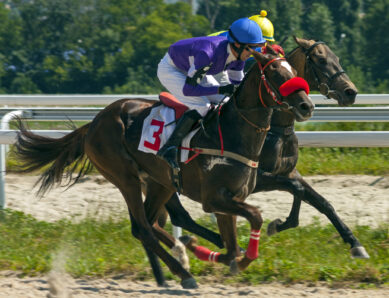Are you the sort of person who sees even a family board game as a life-or-death struggle for victory?
Speaking personally, I’m so competitive that it frightens my friends, my family, and even my colleagues. There’s nothing I won’t turn into a competition: “You’ve got a cold? I’ve got the flu! You’ve got the flu? I’ve got a terminal alien parasite!”
I once bet an unsuspecting co-worker at a Christmas party that I could eat more chili sauce than him. Needless to say, I won, but at the cost of spending the rest of the evening gulping water to cool my burning tongue.
I may be an extreme example, but I have found that my overwhelming urge to win is a great driving force at work. So, does a competitive personality actually help or hinder your career? After all, certain professions, such as sales, depend on healthy competition to maintain productivity. (You can explore this topic in more detail in our article, How to Manage Rivalry in the Workplace.)
Competition Isn’t for Everyone
Some people’s competitive urge is driven by either the intoxicating thrill of winning, or the mortifying fear of losing. But the upshot is that this can lead to higher performance and greater achievements.
But, while competition can fuel a creative and innovative fire in some, it can extinguish enthusiasm in others. For those who don’t feel the need to “win” all the time, competition can cause unnecessary anxiety and stress, and they may feel dominated by bigger, more competitive personalities.
What Makes You Competitive?
Ashley Merryman, award-winning writer and co-author of “Top Dog: The Science of Winning and Losing,” asserts that there are two types of people: warriors and worriers.
Warriors are natural adrenaline-seekers, who rely on the stress of high-pressure environments or competition to get the “buzz” they need to perform at their best.
Worriers, on the other hand, get stressed at the thought of competition, and it can negatively impact their performance.
Warriors are therefore pretty much genetically wired to enjoy competition. And, as long as they have opportunities to challenge themselves, they will always be looking for their next big win.
How to Lose Friends and Alienate People
Winning is a great feeling. Plenty of people would “give their right arm” to be named Employee of the Year, and would use it as motivation to push themselves to be even better the following year. But, where there are winners, there will likely be losers.
And what if these “losers” already have low self-esteem? Missing out on rewards or recognition could damage their confidence even further. That’s why a manager should ensure that every member of a team is valued, not just the star players.
And remember, no one likes a braggart, so don’t rub your victories in your team members’ faces!
Watch Out for Burnout
One problem with competitive people is that they can sometimes push themselves too hard. Once they taste success, they start to chase their next “high.” In extreme cases, this can lead to unethical, or even illegal, behavior. But the more likely consequence is that they risk burnout.
They may not even notice that they are taking on too much until it’s too late. Instead, competitive people should seek to challenge themselves within the responsibilities they already possess. For example, they could request training to use a new form of software, or to improve their industry knowledge.
The trick is to not rely on competition as your only form of motivation, but to think about how you can use it to your advantage – without alienating your colleagues.
Are you a competitive person at work? Or have you ever suffered from someone else’s competitiveness? Share your experiences, below.




